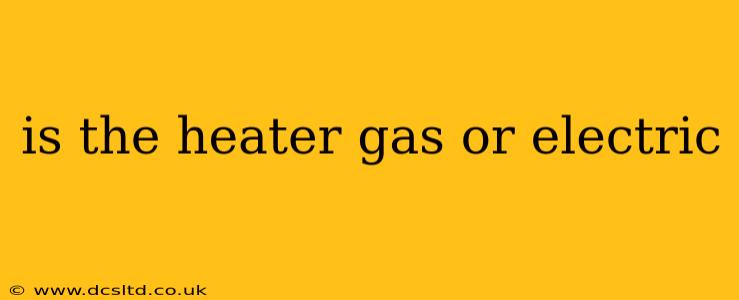Is Your Heater Gas or Electric? Understanding the Differences
Choosing between a gas and electric heater is a crucial decision for homeowners, impacting both comfort and energy bills. The best choice depends on several factors, including your budget, climate, home setup, and environmental concerns. Let's delve into the key differences to help you determine which type of heater is best suited for your needs.
What are the pros and cons of gas heaters?
Gas heaters, whether natural gas or propane, offer several advantages:
- Higher Efficiency: Gas heaters generally boast higher efficiency ratings than electric heaters, meaning they convert a larger percentage of fuel into heat. This translates to lower energy bills, especially in colder climates where heating demand is high.
- More Powerful Heating: Gas heaters often provide more immediate and intense heat, making them ideal for quickly warming larger spaces. This is particularly beneficial in colder regions or during extreme temperature drops.
- Lower Running Costs (Often): While the initial installation cost might be higher, the lower operating costs can make gas heating more economical in the long run, especially for larger homes.
However, there are also drawbacks:
- Installation Costs: Installing a gas heater typically involves more complex plumbing and ventilation requirements, leading to higher upfront costs compared to electric heaters.
- Safety Concerns: Gas leaks pose a significant safety risk, requiring regular maintenance and inspection to prevent accidents. Proper ventilation is also crucial to avoid carbon monoxide buildup.
- Environmental Impact: Burning natural gas produces greenhouse gas emissions, contributing to climate change. While less impactful than some other fuel sources, it's still an environmental consideration.
What are the pros and cons of electric heaters?
Electric heaters offer several benefits:
- Lower Installation Costs: Electric heaters are generally easier and cheaper to install, requiring only an electrical outlet. This makes them a convenient option for renters or those on a tighter budget.
- Cleaner Energy: Electric heaters produce no greenhouse gas emissions at the point of use, making them a more environmentally friendly choice compared to gas heaters (provided your electricity comes from renewable sources).
- Greater Safety: Electric heaters eliminate the risk of gas leaks and carbon monoxide poisoning, making them a safer option for homes with young children or the elderly.
- Easy Maintenance: Electric heaters require minimal maintenance, mainly involving occasional cleaning.
However, they also have limitations:
- Lower Efficiency: Electric heaters are generally less efficient than gas heaters, converting a smaller percentage of energy into heat. This results in higher energy bills, especially in cold climates.
- Less Powerful Heating: They may take longer to heat a space and might not be as effective in larger areas.
- Higher Running Costs (Often): Although installation is cheaper, the higher energy consumption can lead to significant running costs over time, particularly in colder regions.
Which type of heater is better for my home?
The best type of heater for your home depends on your specific circumstances. Consider these factors:
- Climate: In colder climates with high heating demands, gas heaters may be more cost-effective in the long run due to their higher efficiency. In milder climates, the cost difference might be less significant.
- Home Size: Gas heaters are often better suited for larger homes, while electric heaters are more appropriate for smaller spaces.
- Budget: Electric heaters usually have lower upfront costs, while gas heaters often have lower running costs over time.
- Environmental Concerns: If reducing your carbon footprint is a priority, an electric heater powered by renewable energy is the more environmentally friendly choice.
Ultimately, weighing the pros and cons of each option and considering your individual needs will help you choose the right heater for your home. Consulting with a qualified HVAC professional can provide further guidance and ensure a safe and efficient installation.
What are the different types of electric heaters?
Electric heaters come in various types, each with its own advantages and disadvantages. Some common types include:
- Radiant heaters: These heaters warm objects directly, making them efficient for smaller spaces.
- Convection heaters: These heaters heat the air, which then circulates throughout the room. They're suitable for larger areas.
- Forced-air heaters: These heaters use a fan to circulate warm air, providing quick and even heating.
Choosing the right type of electric heater will depend on factors like the size of the room and personal preferences.
What are the different types of gas heaters?
Gas heaters also come in various forms, including:
- Furnaces: These central heating systems are typically installed in basements or utility rooms.
- Boilers: These systems use hot water or steam to distribute heat throughout a building.
- Space heaters: These portable heaters provide localized heating.
Understanding these distinctions is essential when selecting the most suitable heating system for your home's structure and specific heating needs. Again, consulting a professional is always recommended.
